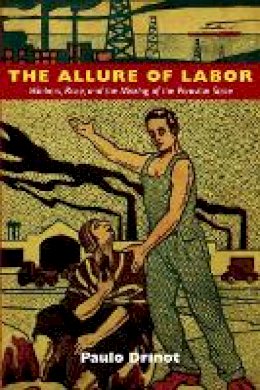Paulo Drinot is Senior Lecturer in Latin American History at the Institute of the Americas, University College London. He is the editor of Che’s Travels: The Making of a Revolutionary in 1950s Latin America, also published by Duke University Press.
“The Allure of Labor is an outstanding book, and its contribution to debates about race, identity, and state formation extend its relevance far beyond Peru.”-Charles F. Walker, author of Shaky Colonialism: The 1746 Earthquake-Tsunami in Lima, Peru, and Its Long Aftermath “In this important book, Paulo Drinot explains perfectly the paradox of Peru’s early-twentieth-century labor legislation. On the one hand, it was comparatively progressive given the country’s level of industrialization. On the other hand, it was entirely inadequate in dealing with the labor conditions experienced by most of the country’s workers. . . . I have long looked for a book that clearly highlights the hopes and fears that ‘modernity’ inspired among Peru’s elites, and the way that their ambivalence was racialized. The Allure of Labor does the trick.”-David S. Parker, author of The Idea of the Middle Class: White-Collar Workers and Peruvian Society, 1900–1950 “The Allure of Labor is an extremely important book that should be read by anyone interested in labor history and the history of populism in the Americas, as well as the social and cultural history of Peru.” - Nathan Clarke (The Latin Americanist) “The Allure of Labor argues persuasively that industrialization in Peru was as much a cultural policy as an economic one, through which intellectuals and policymakers came to believe the country would be turned into a civilized nation.” - Gavin O'Toole, (Latin American Review of Books) “Drinot’s book provides a fascinating investigation into how the Peruvian state strived to fashion labour into an agent of progress. . . . The Allure of Labor opens up space for fruitful discussions, providing a wealth of historical data on Peru that can enrich existing debates on the racialization of food, space, health and labour.” - Karem Roitman (Ethnic and Racial Studies) “The Allure of Labor is a path-breaking, revisionist reinterpretation of state policies towards labour and its role in the modernization of Peru in the first half of the twentieth century.” - Peter Klaren (Social History) “Drinot’s inclusion of a broad variety of perspectives is one of the real strengths of this book. We hear from bureaucrats, public intellectuals, lawyers, presidents, communists, APRA activists, anarchists, employers, and workers themselves. The range of workers considered is likewise diverse: bakers and printers, carpenters and sugar workers, telephone operators and oil workers all appear in the book. . . . This is a valuable book for Latin Americanist historians of labor and race, and a crucial read for historians of Peru.” - Jaymie Patricia Heilman (American Historical Review) “Paulo Drinot’s The Allure of Labor manages to say a lot of interesting new things about Peruvian workers, in what is an exemplary study of “governmentality” in Latin America.... this is a smart (and not incidentally, superbly written) book... The finest scholarship raises many new questions, and in this spirit I highly recommend The Allure of Labor to the widest historical audience.” - Paul Gootenberg (Labor)

